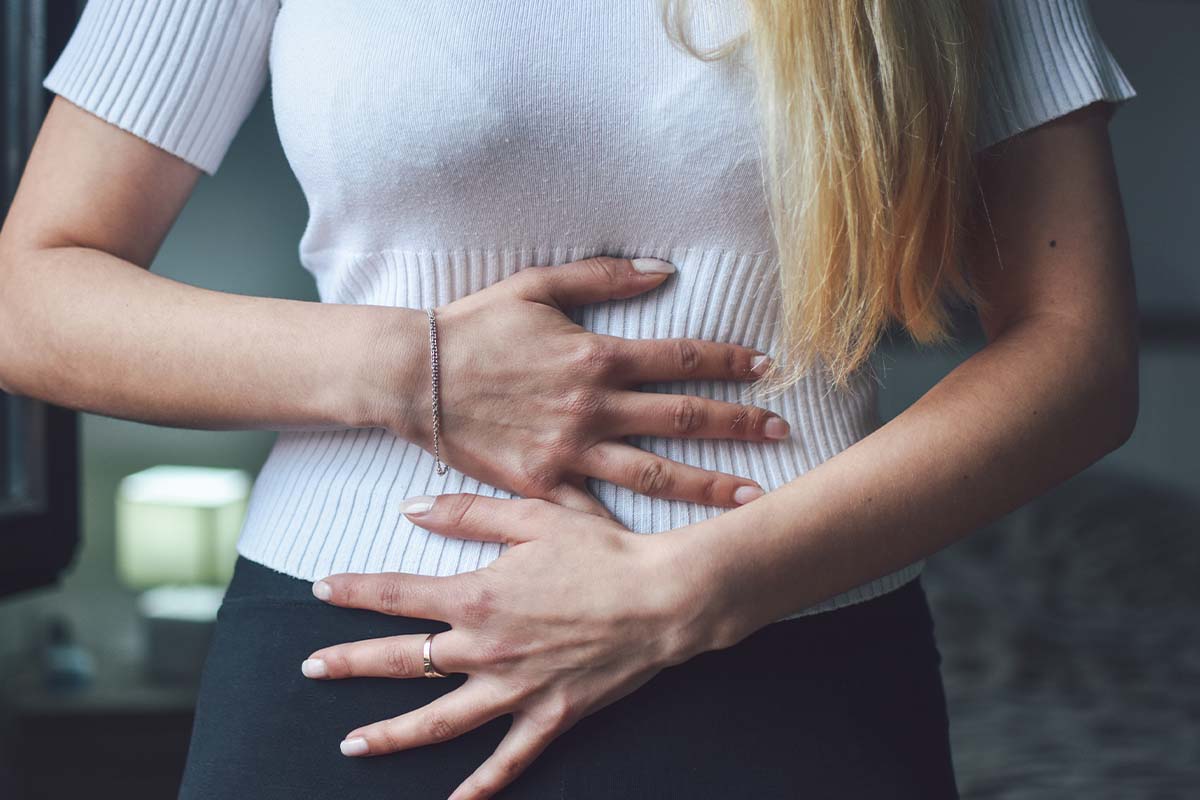SIBO (Small Intestinal Bacterial Overgrowth) is the presence of abnormally high amounts of bacteria in your gut that produce a gas that causes symptoms, including, but not limited to, bloating, flatulence, abdominal pain, nausea, dyspepsia, fatigue, diarrhea, and constipation. Studies indicate that up to 80% of people with irritable bowel syndrome (IBS) have SIBO. Dr. Elena Ivanina is a SIBO specialist in NYC.
WHAT IS SIBO?
Small intestinal bacterial overgrowth (SIBO) is when an excessive amount of bacteria accumulates in the small intestine. This can cause various digestive problems, such as bloating, gas, diarrhea, abdominal pain, and non-digestive symptoms, like joint pain, skin rashes, and fatigue. While the underlying causes of SIBO are not yet fully understood, the condition is treatable with dietary changes, antibiotics, and other therapies.

There are 3 types of SIBO:
Hydrogen SIBO is an overgrowth of bacteria in the small intestine, including E. Coli and Klebsiella, that causes either diarrhea or constipation.
SIBO Sulfide is an overgrowth of bacteria in the small intestine that produces sulfur gas and most commonly presents with diarrhea. Levels of hydrogen sulfide, as measured by a breath test, correlate with the severity of diarrhea.
IMO is an overgrowth of methane-producing archaea in the small and/or large intestines and presents with constipation. This was previously called “methane SIBO,” but methanogens are not bacteria (the “B” in SIBO) but are archaea, a group of single-celled organisms. The level of methane measured by a breath test correlates with the severity of constipation. This is a condition that can be treated by Dr. Elena Ivanina, a SIBO specialist in NYC.
IMO (Intestinal Methanogen Overgrowth)
IMO, or Intestinal Methanogen Overgrowth, refers to the presence of excessive methane-producing bacteria in the gut. This condition often coexists with SIBO and can contribute to more severe symptoms, including constipation and bloating. Unlike hydrogen-dominant SIBO, which typically responds well to single antibiotic therapy, IMO may require dual antibiotic treatment to target methanogens effectively. Accurate diagnosis and tailored, as overseen by specialists like Dr. Elena Ivanina, are essential for managing IMO effectively.
Symptoms:
- Chronic constipation, often resistant to conventional treatments
- Severe bloating and distension, especially after meals
- Abdominal discomfort and pain, particularly in the lower abdomen
- Difficulty passing gas or feeling incomplete evacuation
- Fatigue and lethargy, possibly due to altered gut microbiota
- Intermittent diarrhea, alternating with constipation in some cases
- Increased methane levels detected in breath tests, indicating methane-dominant IMO
- Non-specific gastrointestinal symptoms, such as nausea or reflux, may also be present
- Methane-associated symptoms, including reduced gut motility and delayed transit time
Hydrogen Sulfide (H2S) SIBO
Hydrogen Sulfide SIBO, or H2S SIBO, is a subtype of small intestinal bacterial overgrowth characterized by the overproduction of hydrogen sulfide gas by a very specific type of bacteria that can overgrow in the small intestine. This gas can lead to symptoms such as foul-smelling gas, diarrhea, abdominal pain, and bloating. H2S SIBO often presents with overlapping symptoms of both hydrogen-dominant and methane-dominant SIBO. This type of small intestinal bacterial overgrowth in NYC is hard to diagnose because hydrogen sulfide cannot be measured with a breath test.
Symptoms:
- Foul-smelling gas, often described as a “rotten egg” odor
- Diarrhea, which may be chronic or intermittent
- Abdominal pain and discomfort, usually in the lower abdomen
- Bloating and distension, exacerbated by certain foods or meals
- Nausea and sometimes vomiting
- Fatigue and weakness, possibly due to nutrient malabsorption
- Intolerance to sulfur-containing foods, such as garlic and onions
- Joint pain and muscle aches, which may be inflammatory in nature
- Cognitive symptoms like brain fog or difficulty concentrating
- Skin problems, including acne, eczema, or rashes, due to systemic inflammation
What Does SIBO Do To Your Body?
SIBO has significant consequences, including multiple gut symptoms, malabsorption, vitamin deficiencies, and brain fog. In SIBO, E. coli and Klebsiella are usually overgrown. These bacteria may be in the wrong place (too upstream in your gut) and, therefore, prematurely ferment dietary carbohydrates and produce short-chain organic acids and gas, causing bloating, diarrhea, and excessive gas after eating, usually hours after eating once the food clears the stomach and gets into the small intestine. So you wake up with a flat stomach, and by nighttime, you’re nine months pregnant. This is something you can learn more about in your meeting with SIBO specialist in NYC, Dr. Elena Ivanina.
Common Symptoms:
- Bloating, particularly after meals
- Abdominal pain or discomfort
- Gas and belching
- Diarrhea or constipation, or alternating between the two
- Nutritional deficiencies due to malabsorption
- Joint pain and muscle aches
- Fatigue and weakness
- Skin problems, such as acne, eczema, and rosacea
- Headaches and migraines
- Depression and anxiety
- Brain fog and difficulty concentrating
- Unintended weight loss
Possible Consequences:
Carbohydrate Malabsorption: Damage to the gut brush border can reduce carbohydrate enzymes called disaccharidases, causing malabsorption of carbohydrates and further worsening symptoms.
Fat Malabsorption: SIBO also leads to fat malabsorption and diarrhea by deconjugation of bile salts, which in turn impairs normal fat digestion, leading to impaired fat absorption, diarrhea, and steatorrhea. The free bile acids formed in this reaction lead to toxic injury to mucosa. Fat malabsorption due to SIBO could lead to deficiencies in fat-soluble vitamins A, D, and E and less likely vitamin K because it is produced by bacterial metabolism.
Vitamin B12 Deficiency: Gram-negative bacteria compete with your body to use B12 from food, so you have none left to absorb for yourself! On the other hand, folate is generated by bacterial metabolism and is absorbed in abundance by the host, so seeing a high folate level is typical in SIBO. Other deficiencies include vitamin D and iron.
Brain Fog: Recently, d-lactic acid production from bacterial metabolism in the human gut has been associated with metabolic changes and brain fog, especially in patients taking probiotics while having SIBO. This is why it is often not recommended to take probiotics while having active SIBO but instead to treat it and then rebuild and restore the microbiome first through probiotics in food, and then to consider probiotic supplements after SIBO treatment in NYC.
There can be many other consequences of SIBO, especially in the presence of increased intestinal permeability (“leaky gut”), which pretty much goes hand in hand with any type of dysbiosis, including SIBO. Therefore, systemic symptoms like skin manifestations, hair loss, and rashes can all occur.

Why Does SIBO Happen?
The most important thing to remember is that SIBO has A ROOT CAUSE. The GI tract has the largest microbial population in the human body, with over 35 trillion bacteria. Most of the bacteria are in the colon, and there is homeostasis with a general population of “good bacteria.” This homeostasis is kept in check by many factors, including stomach acidity, motility, and secretions in the 19 feet of the small intestine, and the ileocecal valve (ICV) as a mechanical barrier preventing backward movement of the bacteria from the colon. Root cause analysis usually finds a problem with one of these factors, including abnormalities in anatomy, motility, pH, medications, immune function, and inflammation — and there can be multiple!
Possible Causes:
- Chronic use of medications that lower stomach acid
- Impaired gut motility
- Previous abdominal surgery that affects gut anatomy or motility
- A weakened immune system due to illness or medication
- Changes in the gut microbiome, such as from antibiotic use
- Intestinal adhesions or obstructions that cause bacteria to accumulate
- Use of feeding tubes
- Poor diet, high in refined carbohydrates and low in fiber
- Aging, as gut function can decline over time.

Meet Dr. Elena Ivanina SIBO Specialist NYC
Introducing Dr. Elena Ivanina, a distinguished quadruple board-certified integrative gastroenterologist and SIBO specialist in NYC. With extensive training from Tulane University and the New York College of Osteopathic Medicine, Dr. Ivanina is dedicated to revolutionizing gut health through holistic methodologies. Her illustrious career includes groundbreaking research in cancer prevention and the attainment of an MPH from Columbia University. As the former Director of Neurogastroenterology & Motility at Lenox Hill Hospital and the current Director of the Center for Integrative Gut Health, Dr. Ivanina seamlessly merges conventional and functional medicine, emphasizing the significance of dietary adjustments in the healing process.
Real patient review
”After years of recurring SIBO and GI distress, I was fortunate that my then-current GI referred me to Dr. Ivanina as he (in addition to others) admittedly was not able to help me. I have been treating with Dr. Ivanina for about a year now and I must say I have not felt this good in a long time. Dr. Ivanina is truly the expert in her field and takes all factors and patient history into account to determine the cause of the issue(s) and optimal treatment plan(s). This unique approach is clear from the outset, as the initial consultation is a full 1 hour where you discuss your medical and personal history with the doctor. She also cares about your lifestyle and how the treatment plan will fit into it, which definitely helps you, as the patient, succeed in sticking to the treatment plan so you reap all the benefits from it and have a positive outcome. Dr. Ivanina's responsiveness is also a huge plus. I have never had an issue getting in touch with and receiving a quick response from Dr. Ivanina irrespective of when I initiate the communication. It can be late evening or over the weekend and I will receive a prompt, thorough response. Gut health is a journey and I can confidently say that I can always rely on Dr. Ivanina.
HOW TO DIAGNOSE SIBO?
The gold standard is the sterile small intestinal aspirate performed during endoscopy by Dr. Ivanina. SIFO culture is performed at the same time. The most common way to diagnose SIBO is through a breath test—with either lactulose or glucose substrate. Lactulose usually overdiagnoses, so you don’t miss any SIBO, and glucose usually underdiagnoses, but it is more accurate. Also, to note, the only current way to diagnose SIBO Sulfide is through the Trio Smart breath test, which is available in Dr. Ivanina’s office, SIBO specialist in NYC.
How To Treat SIBO?
Root Cause Analysis
Make sure you get a full workup for the underlying causes of SIBO, including lab testing, stool testing, endoscopic evaluation, and possibly other important testing such as IBS SMART after an infection (you sometimes don’t even realize you had an infection! For example, one or two days of diarrhea that you brushed off to “something you ate”), and smart pill—a pill that measures stomach, small bowel, and colonic transit as well as stomach acid!
Induction With Antibiotics or Antimicrobials
Hydrogen SIBO is usually responsive to one antibiotic, while IMO necessitates dual antibiotic therapy to target hard-to-reach/treat methanogens. If antibiotics haven’t worked or have failed, there are natural herbal antimicrobials you can discuss with Dr. Ivanina. Elemental diet is reserved for extreme cases when everything else fails.
Maintenance With Prokinetics
Most cases of SIBO have a motility component, for example, a disordered migrating motor complex (MMC) in the small bowel after infection and/or inflammation. The MMC is your housekeeper wave that keeps your small intestine clean and SIBO-free—it is key to optimize this function with prokinetic medications/herbs and time-restricted feeding (fasting periods). All of these will be covered in depth during your consultation for your SIBO treatment in NYC with Dr. Ivanina.
Subscribe To Our Newsletter
This content is an example of the information available within our exclusive gut love community, covering everything from gut health and scientific updates to digestion and natural nutrition strategies. Learn about digestion, nutrition, fatty liver solutions, colorectal cancer prevention, and general gut health by subscribing to our newsletter. and natural vitamin and mineral replenishment, with upcoming video courses, yoga classes, and more coming soon!
Join Today
Subscribe to our newsletter and stay up-to-date on the latest in gut health and wellness. Receive exclusive tips, news, and insights from Dr. Elena Ivanina and our team of experts.



